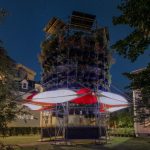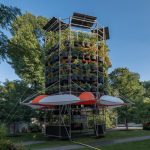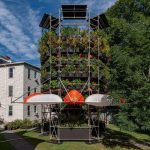POLINATURE HARVARD UNIVERSITY – USA
A temporary mini-architecture has been installed on the campus of Harvard University, part of an academic project to demonstrate a “short-term strategy that instantly generates biodiversity and climate comfort.” Designed by Madrid-based studio Ecosistema Urbano, Polinature is a modular tower with inflatable tents and piles of native plants, capable of mitigating the effects of climate change in urban areas.
Designers Belinda Tato and Jose Luis Vallejo created a metal scaffolding, to which secondary elements and devices can be easily added as “plug-ins.” The whole thing is made of reusable elements that are relatively easy to find, cheap, and easy to assemble or disassemble.
The structure was initially designed for communities affected by the “park equity gap” — the disparity in access to green spaces that disproportionately affects low-income communities and communities of color.
Polinature is therefore made up of three basic components: a scaffolding, native plants and awnings that surround its base. The structure also contains a crown of solar panels that power it.
The scaffolding is combined to create a vertical tower, stabilized by counterweights and metal wires, and then wrapped in rows of native potted plants, which attract visits from local pollinators.
The lower canopy system, created by Rhode Island design firm Pneuhaus, provides shade, lighting and “climatic” comfort to visitors through an alternating pattern of white and orange “bubbles.” The white units are “permanently inflated” and contain LED lighting, while the orange units intermittently emit a blast of cool air in response to sensors that measure “climatic discomfort.”
By: Domusweb.it
Ph credits: Emilio P Doiztua











